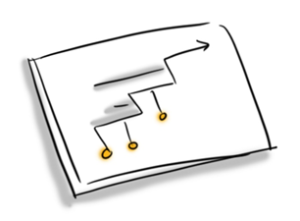EXTAFR100/EXTAFR106/Design Thinking/Design
| “ | Design is about problem solving, not about personal preference or unsupported opinion. | ” |
| —Bob Baxley | ||
Now that you have mapped out a plan, how do you actually want to prototype? We suggest one of two ways:
- Dig into the Tool
- Use Creative Materials
Dig into the Tool
If you decide to take the leap and start working with the tool, keep in mind that this requires dedicated time. If it is your first time using the tool, go through any tutorials provided, or search for some online – undoubtedly there are others that you can learn from. Also reassure yourself that this prototype does not need to solve the learner challenge entirely – perhaps it is just one aspect of the challenge that you have uncovered. Start small, and remember that it is not about perfection! That is the whole idea behind prototyping – you create what is known as the 'minimal viable product'.
Prototype with sticky notes
You can always take a cautionary, but equally valuable approach by mocking up your prototype using sticky notes. Sticky notes can help you storyboard and prioritise the sequence of interactions that support the use of your technology. You can add steps in and move them around, and ultimately end up with a series of instructions that can help frame the activity for your learner.
Share a picture of your sticky note (or other!) prototype in this Discussion Forum to obtain feedback from your peers. Think about providing feedback to your fellow learners on their prototypes with regard to the following:
- What worked?
- What did not work?
- What questions do you have?
- Could learners experience any barriers in using this prototype? If so, how could they be overcome?
- Do you have any ideas for them to consider?
If this is your first time posting in an OERu Forum, you will need to create an account.

